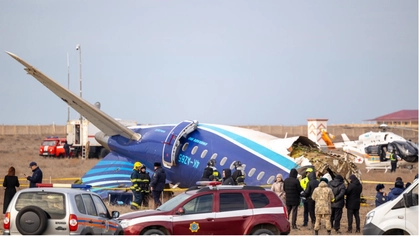According to the ASTRA Telegram channel Russian aviation has dropped more than 60 FAB aerial bombs and other unidentified munitions on Russian and occupied Ukrainian regions since the end of February, based on its review of local media and other sources. In May alone there have been more than 20 reported incidents.
The FAB series of general-purpose high explosive fragmentation aviation bombs were developed in the Soviet Union in the 1950s and modified to be more streamlined and set-up for carriage on fighter bomber’s external hard points in the 1960s. The FAB-500 contains around 300 kilograms (660 pounds) of explosive and the FAB-250 has 100 kilograms (220 pounds).
JOIN US ON TELEGRAM
Follow our coverage of the war on the @Kyivpost_official.
The bombs were originally unguided, with a single nose fuse, and compatible with most models of Soviet aircraft. However, since January last year they have been modifying many of these “dumb bombs” by strapping on pop-out wings combined with GPS / or the Russian GLONASS guidance systems to use them as long-range glide bombs.
On Sunday, May 12, a multi-story building in the city of Belgorod was destroyed by an explosion that Russia blamed on Ukraine although many, including OSINT analyst Oliver Alexander, feel it was more likely caused by a Russian aerial bomb.
On May 10, only two days before, 5 FAB aerial bombs were inadvertently dropped on villages in the region: two FAB-500s on the village of Komsomolsky, a FAB-250 near the village of Yablochkovo, and another FAB-500 near the village of Razumnoye. Then on May 11, a FAB-250 was found on the territory of a factory near Novaya Tavolzhanka.

Russian Aviation Crisis: Two Passenger Jets Suffer Mid-Flight Engine Failures
On May 13, the day after the devastating explosion in the city, a FAB-500 aerial bomb was dropped near the village of Varvarovka and later that day a FAB-250 was found near the village of Nikolskoye. None of the “unplanned arrivals” were mentioned by either municipal or regional authorities.
On the afternoon of Saturday, May 4 an explosion in Razdobarkina Street in Belgorod injured 7 people and damaged more than 30 houses. Once again the Russian authorities initially claimed it had been caused by a Ukrainian drone attack before independent sources identified the cause as a FAB-500 dropped from a Russian aircraft.
On May 14 an unidentified munition fell from a Russian aircraft onto the village of Probuzhdenie. The munition exploded, leaving a crater about a meter deep. There were no casualties.
On the afternoon of May 15, 3 FAB-500s fell in the Belgorod region. One landed in the Lazurny water park in the village of Lazurnoe near Belgorod, another near the village of Krutoy Log, and the third in the village of Zarechye-Vtoroye.
On May 16, Russian military aircraft dropped 5 FAB-500 and 3 FAB-250 aerial bombs on the Belgorod region near the villages of Bolshoye Gorodishche, Dobroye, and Polyana.
It is not only Russian territory that is suffering from what some have called an epidemic of accidental bombing. Another ASTRA report, on May 15, said that almost 40 FAB-500 have been dropped on areas of the so-called Donetsk People’s Republic (DNR) which lacks the resources to deal with them. They are currently lying un-defused in the districts of Yenakievo, Shakhtarsky, and Makeevka with each location guarded by police officers around the clock.
Theories about why this is happening consider a range of possibilities. A UK Ministry of Defence intelligence update in January considered the incidents were likely caused by a combination of inadequate training leading to faulty procedures for arming aircraft prior to flights, poor mission execution by aircrew, and crew fatigue. It may also be that the glide bomb modification on some have failed causing them to fall on Russian territory rather than distant Ukrainian targets.
Others have wondered if some of the incidents, where more than one bomb lands close together, have been caused by pilots intentionally jettisoning their payload either before or after carrying out their bombing run – whether through fear of Ukrainian air defenses or, less likely, from a moral standpoint as they know their bombs are being launched against civilian targets.
You can also highlight the text and press Ctrl + Enter










